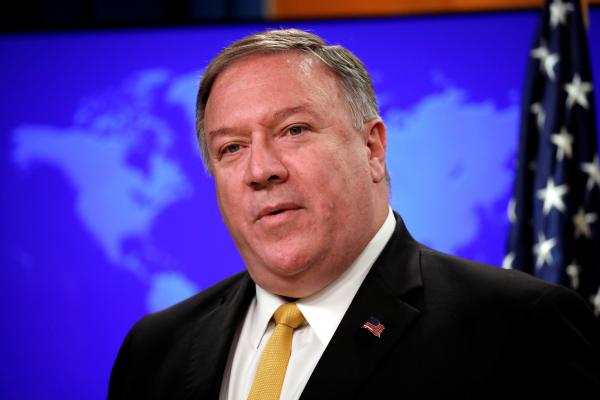From July 16-18, Secretary of State Mike Pompeo hosted the second annual Ministerial to Advance Religious Freedom, which is touted as the “the largest religious freedom event of its kind in the world.” More than a thousand attendees representing delegations from 106 countries arrived in Washington D.C. to discuss challenges to religious liberty and how to collectively address the threats facing people of faith worldwide.
Over the course of three days, U.S. and foreign officials as well as grassroots representatives participated in plenary sessions and breakout panels on topics such as protection for religious sites or combating anti-Semitism. Survivors of religious persecution were honored for their resilience — from Nobel Prize winner Nadia Murad to holocaust survivor Irene Weiss. A robust program of more than 80 side events supplemented the ministerial by offering specialized events on issues ranging from homeschooling in Cuba to the plight of Bahai’s in Iran. To casual and expert observers alike, the summit was an overwhelming success for the cause of religious liberty.
In his address to the summit, Vice President Mike Pence underscored how religious liberty is not only an unalienable right but the next frontier for human rights. While the framing of religious freedom as a human right is not a novel feature in American foreign policy or international diplomacy, it is currently used by the Trump administration to justify its unilateral statecraft. The emphasis on the ministerial as an explicitly human rights initiative comes at a time when the United States is abandoning its commitments to the international community and allies.
On June 18, 2018, Pompeo and Nicki Haley, then-Ambassador to the United Nations, announced that the U.S. would withdraw from the UN Human Rights Council on the basis of the council’s ineffectiveness and “chronic bias against Israel." On May 15, Pompeo announced a visa ban on International Criminal Court (ICC) personnel looking to investigate American officials, a measure Richard Dicker, International Justice Director at Human Rights Watch, called “an outrageous effort to bully the court and deter scrutiny of US conduct.”
This rejection of multilateral institutions is part and parcel of a broader U.S. withdrawal from the treaties, agreements, and diplomatic precedence that has previously defined American leadership on universal human rights. According to Ted Piccone, Senior Fellow at the Brookings Institute, these policy shifts collectively demonstrate how the Trump administration is quick to “weaken institutions not to its liking, abandon them if they do not comply with its demands, pick fights with democratic allies while cutting deals with autocrats, and go it alone with little regard of the costs to U.S. interests.” In its place, President Trump, along with Vice President Mike and Secretary of State Pompeo, have prioritized religious liberty at the expense of other human rights.
The ministerial comes on the heels of Pompeo’s new Commission on Unalienable Rights, a body established earlier in July to “distinguish between original unalienable rights and ‘ad hoc rights’ that have been added since the end of the Cold War.” In other words, the State Department is re-evaluating what constitutes a fundamental human right, presumably with the intention of weeding out those rights it determines to be alienable. The formation of the commission has concerned reproductive and LGBTQ rights activists who consider the State Department’s initiative as a shift away from inclusive human rights in favor of a primordial conceptualization of “original” rights.
This linguistic pivot and exclusionary stance are also adopted by key U.S. officials spearheading domestic religious freedom. Tony Perkins, the director of the Family Research Council (FRC), was recently elected chair of the United State Commission for International Religious Freedom (USCIRF) to much criticism from the press. While USCIRF is a bi-partisan commission addressing international religious freedom, Perkins and the FRC advance its own exclusionary vision of domestic religious liberty fueled by anti-LGBTQ and anti-Muslim rhetoric. From calling Islam “16 percent of a religion” to describing the LGBTQ fight for equality as “nefarious schemes” in a recent email blast, Perkins’ discriminatory positions and public discourse reflect a growing disregard for the inclusivity of all human rights.
Other ministerial participants did offe both subtle and overt critiques of the summit and exhorted advocates to consider the ways in which the administration can be held accountable to uphold all human rights. On the eve before the ministerial, the advocacy organization In Defense of Christians held an ecumenical prayer event at the U.S. Capitol in support of persecuted minorities in the Middle East. Rep. Jackie Speier (Calif.-D), a congresswoman of Armenian descent, addressed attendees and described a recent trip to the border where she noticed “rosaries” and other evidence of people of faith being detained. She finished her address by noting: “So as we recognize the responsibility to protect Christians around the world, I hope we will also look at opportunities to protect Christians in our bordering countries.”
Others asked how the administration can be an advocate for religious freedom when Trump’s executive order to limit migration from seven Middle East and North African countries — also known as the Muslim ban — not only affect Muslims but vulnerable religious minorities the President claims to protect. In a move that would likely exacerbate the problem, President Trump is currently proposing a restriction on all refugee resettlement in the United States — by definition, closing the doors to migrants who are defined by their “well-founded fear of persecution on account of race, religion, nationality, membership in a particular social group, or political opinion.”
While there is no doubt that religious freedom demands U.S. support and action, creating a hierarchy of “unalienable” rights using exclusionary methods and isolationist policies is a threat to all human rights, including religious liberty. Many survivors of religious persecution, as well as communities currently facing threats on the basis of their faith, depend on several institutions currently shunned by the Trump administration. From ICC prosecution of the crimes committed against the Yazidis by ISIS in Northern Iraq to the resettlement of religious and ethnic minorities by the United Nations High Commission on Refugees, a commitment to religious freedom requires engaging the international community. Religious liberty can only be strengthened from renewing these commitments.
Got something to say about what you're reading? We value your feedback!







